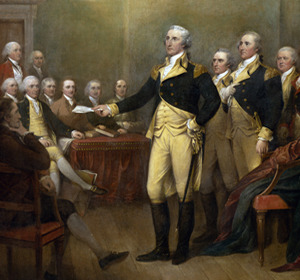Documents of Freedom
PDF: Full Student Activity Booklet
Resource Overview:
Dive into the story of America’s founding and founding documents. Documents of Freedom is a U.S. history and government curriculum covering the Founding vision for American government and the on-going struggle to achieve it.
CIRCLE Study
A 2014-2015 study by the Center for Information and Research on Civic Learning and Engagement (CIRCLE) Jonathan M. Tisch College of Citizenship and Public Services at Tufts University found that students using Documents of Freedom scored 18.3 percentage points higher than the control group with an increase in knowledge of history, government, and economics, and 8.3 percentage points over the control group with a gain in affinity for the importance of civic virtue and constitutional principles. In addition, 87.5 percent of the educators using the resource stated that they would incorporate civic virtue into their future lessons.
Features
- Completely free, comprehensive digital course on history, government, and economics
- Written for teachers by teachers
- Focused on primary sources
- Accessible everyone on any device
- Easily searchable by topic or key word
- Aligned with state standards
- Designed to be used as a course or by accessing individual units and lessons
- Contains 66 ready-made lesson plans, an annotated handbook of Primary Sources, 76 essays, and over 100 student activities.
Teachers Say:
“{Through these lessons} my students were able to take primary documents and personalize the ideas, thus take ownership of those Founding ideas and virtues.” Pilot test Eductor
Students Say:
“It has made me look at the US Constitution and system of government from a whole new perspective because now I know so much more about how they affect our society today and what roles the play as far as the rights of citizens go.”
“It has showed me that it is important to use the rights of a citizen because they were so fiercely fought after.”
“It has sparked a new interest in overall law and how our government functions.”
Create playlists, save resources to your library, and access answer keys – Sign up for an educator account!
9 Units
 Unit
UnitAn Introduction to Documents of Freedom
In this introductory unit, students will be given an overview of the entire course as well as an introduction to Founding principles and virtues necessary for a successful constitutional republic.
 Unit
UnitThe Foundations of American Goverment
America's Founders looked to the lessons of human nature and history to determine how best to structure a government that would promote liberty. They started with the principle of consent of the governed: the only legitimate government is one which the people themselves have authorized. But the Founders also guarded against the tendency of those in power to abuse their authority, and structured a government whose power is limited and divided in complex ways to prevent a concentration of power. They counted on citizens to live out virtues like justice, honesty, respect, humility, and responsibility.
 Unit
UnitThe Purpose of Government
The structural or institutional features of the American constitutional order only make sense in the context of what the Founders hoped to achieve--securing the right of the American people to live decent, worthwhile lives according to their own goals and faculties. The thoughtful preservation of those institutions, occasionally through necessary corrective measures, depends on a proper understanding of what it is that they are designed to promote as well as an appreciation of how to manage those institutions to serve the best interests of the American people. All of this requires a citizenry with the skills and dispositions necessary for republican self-government, that is, a citizen body whose members understand and act to promote justice.
 Unit
UnitThe Tradition of Rights
Rights claims have always been central to American political discourse. In the Founders' view, no human being is so decisively superior to other adult human beings that he is entitled to direct their actions without their express consent. By Nature all adult human beings, regardless of their race, sex or class, are free to rule themselves or, what is the same, to exercise the same "inalienable rights," including the right to life, physical liberty, acquire and use property, marry and raise children, communicate one's opinions, and worship God according to the dictates of one's conscience.
 Unit
UnitLiberty and Equality
In this unit, students will learn about the struggles for liberty and equality throughout American history.
 Unit
UnitCitizens in Communities
During the War of Independence, British North Americans expanded the principles of federalism and separation of powers by being among the first Europeans to codify their practices in written constitutions. Several colonial charters and their subsequent revisions established a practice of protecting the interests of towns, villages, and communities by securing their economic interests as well as their participation in colonial governments.
 Unit
UnitFree Enterprise
The evidence seems overwhelming that free enterprise and widespread economic prosperity are more than just connected; the first leads directly to the second, not just in America but around the world.
 Unit
UnitOur Commercial Republic
Our commercial republic is rooted in the ideas of John Locke and Adam Smith.
57 Lessons
 Lesson
LessonCivic Virtue and Our Constitutional Republic
The United States Founders believed that certain civic virtues were required of citizens in order for the Constitution to work. Numerous primary sources—notably the Federalist Papers and the Autobiography of Ben Franklin—point us to the “Founders’ Virtues.” Before exploring the Documents of Freedom, it is important to understand civic virtue as an essential element of self-government.
 Lesson
LessonHandbook of Annotated Primary Sources
Primary sources are a main focus throughout Documents of Freedom. Here we offer many of the most important primary sources from American history that include annotations to help you understand the purposes of each document.
 Lesson
LessonThe Declaration of Independence – Docs of Freedom
The Declaration of Independence was drafted by Thomas Jefferson in June of 1776. The Declaration announced to the world that the thirteen American colonies regarded themselves independent sovereign states. It articulates the fundamental ideas that form the American Nation: All people are created free and equal and possess the same inherent, unalienable rights. This lesson plan includes six activities. The activities can be taught in sequence as a comprehensive overview of the Declaration of Independence or individual activities can be taught as stand-alone lessons.
 Lesson
LessonJustice for All
What were the Founders’ concepts of justice, liberty, and rights and where did those concepts came from? How have these ideas changed over time? Use these primary sources to analyze.
 Lesson
LessonThe Constitution
In 1787, many Americans were concerned that the Articles of Confederation did not grant enough power to the central government to protect the rights of the people. Under the Articles, the national government was unable to regulate commerce, taxation, currency, treaties, and protect the rights of individuals and states. The states called a delegation to meet in Philadelphia in the summer of 1787 and from that convention the new Constitution was born.
 Lesson
LessonEqual and Inalienable Rights
All humans are born with equal inherent rights, but many governments do not protect people's freedom to exercise those rights. The way to secure inalienable rights, the Founders believed, was to consent to giving up a small amount of our freedom so that government has the authority to protect our rights. Freedom depends on citizens having the wisdom, courage, and sense of justice necessary to take action in choosing virtuous leaders, and in holding those leaders to their commitments.
 Lesson
LessonPopular Sovereignty and the Consent of the Governed
The Founders believed that the government’s authority needed to come from the people. Under the reign of King George III, the colonists believed that they were deprived of their opportunity to consent to be governed by Parliament through representatives, and, therefore, the British could not force their laws upon the colonies. The Founders made sure to uphold this right in the American Constitution. The people, through their representatives at state ratification conventions, had to ratify the document in order for it to become law.
 Lesson
LessonRule of Law
The benefits of freedom are safest when officials cannot make arbitrary and unpredictable laws. The rule of law means that laws are stable, limited in scope, and applied to every citizen, including those who make them. Laws must be created in the open, according to clear rules, and must reflect the consent of the governed. Ultimately, the rule of law depends on people with the courage, self-reliance, and wisdom to make prudent decisions, and who have enough tolerance for others to let them live as they see fit.




















































